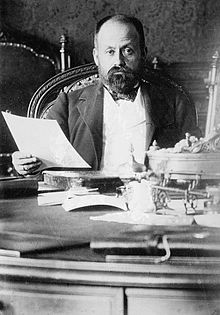Cipriano Castro
Cipriano Castro (born October 11, 1859 in La Ovejera de Capacho , Táchira , Venezuela; † December 5, 1924 in Puerto Rico ) was President of Venezuela from 1899 to 1908 and ruled dictatorially . He was the first in a line of five Venezuelan dictators, all of whom came from the Táchira state in the west of the country.
Life
Castro was an admirer of Bolívar and Napoleon and had a deep dislike for the elite in the capital, Caracas . He was the owner of latifundia in a remote Andean region , which is why, despite his undisputed feudal power , the wealthy capitals referred to him as "the little cattle thief from the Andes". A decision made by the Congress in Caracas on April 22, 1899, which would have resulted in a curtailment of the autonomy of the states of Venezuela, provided him with the pretext for a revolt against President Joaquín Crespo . His private army marched from the Andean state of Táchira on Caracas, which was conquered in October 1899, under the slogan of wanting to “restore” the current constitution, which the decision of the Congress actually violated . After this successful so-called Revolución Liberal Restauradora , the constitution of 1864 came into force again when Castro took office as president.
But even he could not avoid the difficulties associated with the modernization and opening of Venezuela initiated by Castro's liberal -minded predecessors and which had favored his accession to power. Venezuela was already heavily in debt due to the railway construction. Under Castro, the national debt grew sharply, which was mainly due to the immense need for money, which arose from the military interference in the Guerra de los Mil Días ("War of the 1000 Days") in neighboring Colombia , as well as Castro's preference for himself to have the German companies Mauser , Krupp and Kugelmann upgraded - which even the German Kaiser Wilhelm II could not prevent. Castro was known for his distinctive personality cult ; he suppressed the opposition by force.
Castro's extortionate policies, with which he forced the bankers of his country to grant new loans, finally led to a group of caudillos , caciques and the English in Trinidad and Tobago revolting against him in December 1901 . These had rallied around the banker Manuel Antonio Matos ; they were also joined by the adventurer Giuseppe Garibaldi the Younger , a grandson of Giuseppe Garibaldi . The so-called Revolución Libertadora was finally crushed by Castro's troops through the victorious battles at La Victoria and Ciudad Bolívar until July 1903. His later successor, General Juan Vicente Gómez, played a decisive role in this .
Due to the steadily increasing national debt , Castro had already announced a moratorium on international debt servicing on March 1, 1902 . This step not only resulted in a naval blockade of Great Britain , Italy , France and the German Empire ( Venezuela crisis ), but also a direct support of the caudillos revolting against Castro around the banker Matos. During this time, not only were the Venezuelan ports blocked, occupied or shot at, but the six ships in Venezuela's new fleet were also put out of action. This conflict was only resolved in February 1903 through the mediation of the United States of America . The International Court of Justice in The Hague ruled that Venezuela had to repay its debts to the European states by 1907. The verdict was seen internationally as a partial success of the Venezuelan government.
Argentina subsequently suggested the Drago Doctrine to prevent future military actions to collect debts. The US had intervened diplomatically because it saw its Monroe doctrine endangered by the events .
For several years after 1903, Castro had no domestic opponents. However, his relations with the United States deteriorated. He also got into a dispute with the Netherlands over their military use of the island of Curaçao . The US company General Asphalt Company was expropriated during this time. When he went to see a doctor in the German Reich in 1908, where he wanted to have his kidney disease treated, his deputy, General Juan Vicente Gómez , seized the opportunity to declare him deposed and to make himself his successor.
literature
- Michael Zeuske: From Bolívar to Chavez: The History of Venezuelas , Rotpunktverlag, Zurich 2008, ISBN 978-3-85869-313-6
- Erminio Fonzo: Italia y el bloqueo naval de Venezuela 1902-1903 Cultura Latinoamericana. Revista de estudios interculturales, n.21 (1), 2015.
Web links
- Biography (spanish)
- Cipriano Castro (Spanish)
Individual evidence
- ↑ a b c d e f Leslie Manigat : L'Amérique latine au XXe siècle - 1889–1929 . H146. Éditions du Seuil, Paris 1991, ISBN 978-2-02-012373-0 , pp. 158–161 (première édition aux éditions Richelieu 1973).
- ↑ a b c Zeuske (2008), pp. 316-319.
- ↑ Zeuske (2008), pp. 322-325.
- ↑ Zeuske (2008), pp. 325 and 335.
| personal data | |
|---|---|
| SURNAME | Castro, Cipriano |
| BRIEF DESCRIPTION | President of Venezuela |
| DATE OF BIRTH | October 11, 1859 |
| PLACE OF BIRTH | La Ovejera de Capacho |
| DATE OF DEATH | December 5, 1924 |
| Place of death | Puerto Rico |
